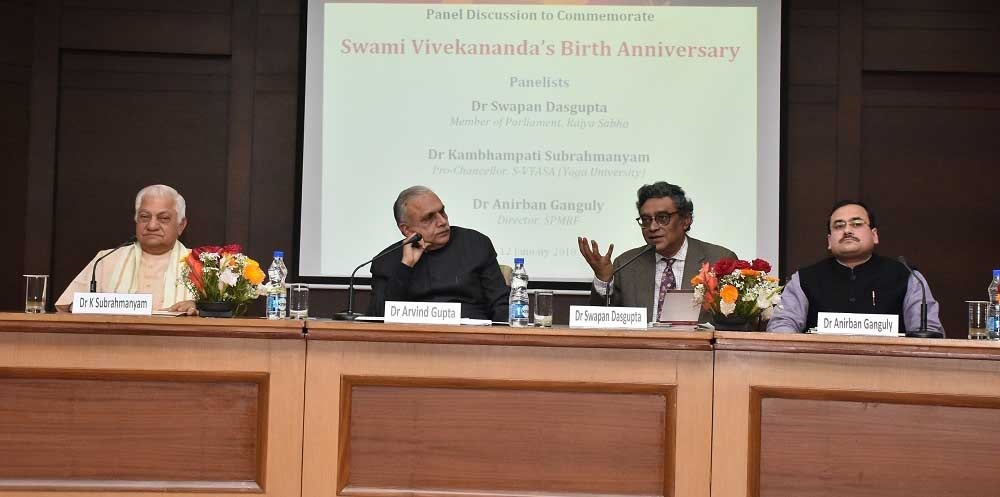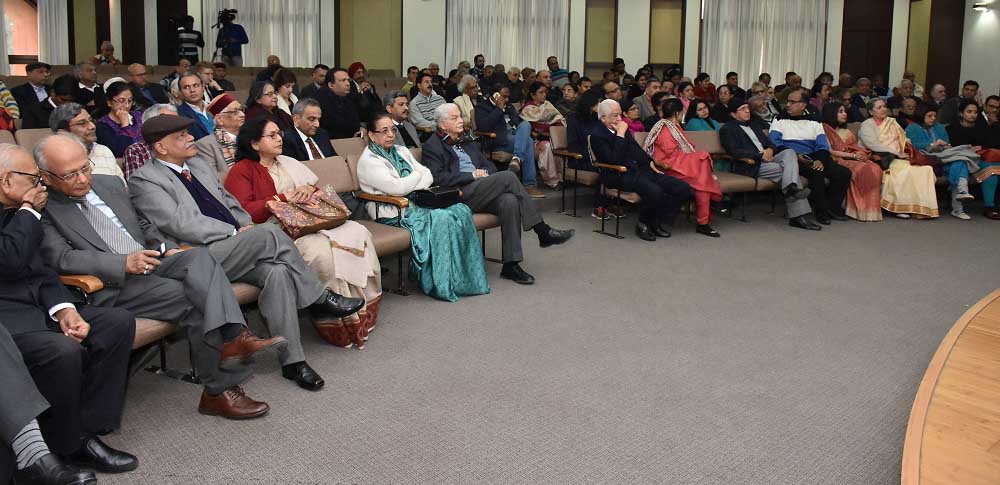The Vivekananda International Foundation (VIF) organized a panel discussion to commemorate the birth anniversary of Swami Vivekananda on 12 January 2018. The eminent speakers in the panel were Dr. Swapan Dasgupta, Member of Rajya Sabha, Dr. K Subrahmanyam, Pro-Chancellor, S-VYASA (Yoga University), and Dr. Anirban Ganguly, Director, Dr. Syama Prasad Mookerjee Research Foundation (SPMRF).
Dr. Arvind Gupta, Director, VIF, welcomed the speakers and gave the introductory speech. He noted that India is witnessing a unique moment in history, where she is about to regain her place among the committee of nations. India is the third largest economy of the world, but her power is not derived from this fact; her greatness comes from her great civilizational achievements. Dr. Gupta aptly summarized the message of Swami Vivekananda, who spoke about the spirit of tolerance in Hinduism at the World Parliament of Religions in Chicago in 1893 and taught the central truth of evolving the God in men. Swamiji’s representation of religion is in harmony with a scientific outlook. Most importantly, Dr. Gupta highlighted, that Swamiji was an intensely practical man—he said it is an insult to offer religion to a starving people. He was also critical of the caste system. Thus he harped on the need for rejuvenation of India, at the same time maintaining that the source of her confidence should be her spiritual attainments. In an international context of terrorism, war and nuclearization, and a national context where identity politics has vitiated the Indian political scenario, we need to look for what we can draw from Swamiji’s message for modern India.

Dr. Swapan Dasgupta spoke on “Swami Vivekananda and the New Narrative of India”. He began by observing that Swami Vivekananda is an icon of Indian civilization, yet he is unique in himself and does not correspond to any stereotype. Dr. Dasgupta pointed out that we cannot ignore the fact that each great person is to a certain extent shaped by his/her context, and the context for Swamiji was a colonized country. He epitomized the yearnings of educated Indians at that particular point of time. The most profound question that plagued the intelligentsia of his times was—“Why is India a subject nation?” We remember Swamiji today as somebody who restored to the nation a sense of sovereignty and pride—a realization of the fact that we are the proud inheritors of the oldest civilization of the world and we have no reason to be defensive. Dr. Dasgupta pointed out the other great contribution of Swami Vivekananda: He enlarged the scope of religion and brought it to the ground. He brought in the concept of daridranarayana, the need to work for the nation, and the importance of reaching out to those who have been trampled over and forgotten. Dr. Dasgupta concluded by noting that not surprisingly, Swamiji was a symbolic inspiration behind many Indians who sacrificed their lives for the country in the freedom struggle.
Dr. K. Subrahmanyam spoke on “Swami Vivekananda and Yoga Education”. He said that today we have a great number of so-called highly qualified people, with closed minds—a fact that demonstrates the failure of the education system. He continued that our modern education system is Macaulian; it is materialistic, body-bound, self-centered, money-making and professional. It does not teach us how to face the problems of life. It does not uplift the soul, and it is not patriotic. Mere professional efficiency is not sufficient to solve the problems of life—moral, psychological, intellectual, emotional and all other kinds of problems. Arjuna was a good archer, but he was unable to face the situation when he saw his friends, family members, teachers and elders on the battle field.

Dr. Subrahmanyam highlighted that education has two components—aparavidya and paravidya. The former is equivalent to the modern educational degrees that we acquire today. The latter trains us to face the problems of life. Our modern education does not include paravidya. He gave the example of Prahlada, who was trained in paravidya in his pre-natal stage itself—he received instruction from Narada when he was still in his mother’s womb. The steadfastness with which Prahlada faced the tremendous problems of his life—constant threat of death—is exemplary. Dr. Subrahmanyam also pointed out that like Abhimanyu, we know how to enter the problems of life—how to have a family, have children, and so on—but we do not know how to come out of them. We get caught in the clutches of the world, but we do not know how to withdraw. Yoga is not just physical postures or asanas, it is mainly psychological—it is the knowledge of how to withdraw from the clutches of the world. Based on the Bhagavad Gita, Swami Vivekananda wrote on the Four Yogas—Jnana, Bhakti, Karma and Raja Yogas.
Dr. Anirban Ganguly spoke on “Swami Vivekananda and India’s Soft Power”. He argued that Swamiji facilitated the process of our interpretation and articulation of ourselves—that is, a narrative of India by Indians. For long, India has been captive to a narrative for India scripted by others, just as a colonized society loses control over interpretation and articulation of its own story. Dr. Ganguly pointed out that when Swamiji was travelling to other parts of the world, he tried to discover traces of India’s civilizational footprints worldwide, which demonstrates that India had a global reach even in the past. According to Dr. Ganguly, what has been central in Swamiji’s contribution is the creation of a civilizational grand-narrative for India at a time when we were colonized—the narrative of India as a civilizational power, distinct from other hegemonic powers, the narrative of Indian exceptionalism. Dr. Ganguly mentioned that Swamiji had proposed to write a book on India’s message to the world and for that, he had jotted down 42 points. Of these points, there was also a point on the principles of Vedanta, which demonstrates how Indian thoughts can be imbibed by other minds as well. In this book, Swamiji intended to articulate the fundamental dimensions of Indian civilization. His four years of stay abroad convinced him that it was in fact not true that Indians had degenerated.
The panel discussion was followed by a lively question-and-answers session. The audience asked a range of questions such as: Why Swamiji has been largely forgotten in our textbooks; what his views were for the advancement of women; if Swamiji had re-defined Hinduism; a comparison of Gandhi, Vivekananda and Savarkar; relationship between Hinduism and humanism; definition and role of soft power, among many such other cognitive issues.


